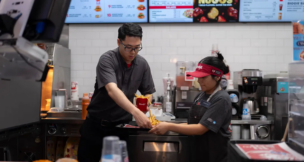Lawmaker’s plan to restrict food stamp purchases sparks controversy
Howard Fischer, Capitol Media Services//November 3, 2025//
Lawmaker’s plan to restrict food stamp purchases sparks controversy
Howard Fischer, Capitol Media Services//November 3, 2025//
Key Points:
-
Arizona lawmaker proposes new food stamp purchase limits
-
Current SNAP benefits already restrict certain items like tobacco and alcohol
-
Average monthly SNAP benefit in Arizona is about $360 per family
As federal courts wrestle over funding food stamp programs, one Arizona lawmaker is preparing legislation to further restrict what can be bought with them.
And while Rep. Leo Biasiucci, R-Lake Havasu City, acknowledges that there already are limits on benefits in the Supplemental Nutrition Assistance Program — tobacco and alcohol for example — he says the whole purpose of the federally funded program, by its very name, is to supplement nutrition. For that reason, he wants to build a program that mirrors one used by pregnant women, new mothers and their offspring in the Women, Infants, and Children program.
And that list is far narrower than what can be bought with SNAP benefits.
But the idea of new limits has been preemptively panned by Senate Minority Leader Priya Sundareshan.
“It’s paternalistic,” said the Tucson Democrat.
More to the point, she said there are better ways to encourage people to use their benefits to buy healthier items, like the Double Up Bucks program, which essentially provides free money to buy fruits and vegetables.
Biasiucci, however, said he remains convinced that the government, which is funding the program, does have a role to play in ensuring that the limited dollars — the average family benefit in Arizona is about $360 a month — are spent on the healthiest items.
This isn’t his first foray into the issue.
Biasiucci introduced a measure earlier this year designed to eliminate candy from what can be bought, defined as any preparation of sugar, honey or other sweetener combined with chocolate, fruit, nuts or other flavorings, for bars, drops or pieces. But Biasiucci dropped that idea after he concluded that it did not distinguish between a KIND Breakfast Protein bar and a Hershey bar.
He had better luck in getting colleagues to approve a measure to simply outlaw the use of food stamps to purchase sodas. But that was vetoed by Gov. Katie Hobbs.
So that, Biasiucci said, leaves the idea of using the WIC purchase list — designed to be healthy for pregnant women and their children — as the basis for SNAP purchases.
“It is the essentials,” he said, including fruit, vegetables, milk, baby formula and food, cereals and things like that. And Biasiucci said using that as a template would be far easier than starting with what now can be purchased with food stamps and culling out what might be inappropriate.
Still, even he believes that list actually might be too restrictive.
It starts, Biasiucci said, with the fact that WIC benefits, under federal regulations, cannot be used to purchase fresh meat, chicken or fish. Instead, the vouchers can buy things like canned tuna — but not solid white or albacore, and not if it is packed in oil.
“I don’t know why,” he said.
There are other things on the list that confound Biasiucci.
Recipients can buy bread — but only if it is whole wheat. Ditto for flour tortillas and pastas.
There’s also a list of cold cereals that are permitted. Hot cereals also are OK, as long as they don’t have added raising, fruit or nuts.
And canned beans also are on the list — but not refried beans or baked beans.
“It’s weird what they include and don’t include,” Biasiucci said.
What’s “weird,” however, may be in the eye of the beholder.
Consider Sen. Lauren Kuby.
“I have a plant-based diet and I’m vegan,” said the Tempe Democrat.
Kuby said if the state is going to go down the path of deciding what is “healthy,” perhaps it should eliminate some of the things that can now be purchased with not just SNAP but also with WIC benefits.
“WIC approves foods like milk and cheese and eggs,” Kuby said. “That’s not good for your diet in my mind.”
All of that goes to the question of the government’s role in making choices for people who are receiving benefits.
“Why is it up to me to decide what’s a healthy food and what’s not?” she asked.
Sundareshan has similar questions.
“Who’s making the decisions here,” she said. “Is it the Legislature making this decision based on what we feel is the most healthful approach?”
There’s the issue of sodas. They’re permitted items with food stamps but not with WIC benefits. But Sundareshan said that ignores the fact that both programs allow the purchase of juices that can have as much sugar.
She said there are other problems with how lines are drawn — and who draws them. For example, Sundareshan noted that food stamps cannot be used to purchase prepared foods intended for immediate consumption, such as hot deli sandwiches or hot soups, that might be sold at grocery stores.
“Maybe that is what someone needs right in that moment,” she said.
And there are other issues that tie into all of this.
SNAP benefits can be used to purchase all kinds of cold cereals. That includes not just frosted flakes but Fruity Pebbles, Count Chocula and Lucky Charms.
“It has more sugar in it than a Coke,” Kuby said.
The WIC list is more restrictive, though it does say recipients can buy Frosted Mini Wheats and Oatmeal Squares Brown Sugar.
There’s some economics behind all this.
“Healthy foods are generally more expensive,” Kuby said. And food stamp benefits are based on household size and income, noting that the average benefit in Arizona is about $360 a month.
“You can’t feed yourself on that,” she said.
Biasiucci agrees on that point.
“The dollars aren’t enough to feed you and your family wholly,” he said. “The point of SNAP is people are struggling, you need to give them a hand-up, you need to make sure there’s food on the table in that state of struggle.”
But he said that just underlines his point.
“These dollars need to be used for the essentials,” Biasiucci said. And he believes that what’s on the WIC list meets that definition.
And he said if people want something more, they can use whatever other dollars are available to them.
Kuby said if that’s the direction he wants to go, perhaps the same restriction should be placed on the daily allowance of taxpayer funds that all lawmakers get while the Legislature is in session. That runs at least $3,500 a year, more for out-county lawmakers who need lodging.
“I like the idea of restricting legislators from using their per diem money on sugary snacks,” she said. “And also on alcohol.”














































